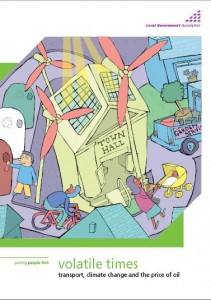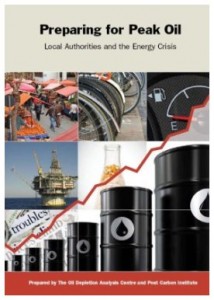Transition Culture has moved
I no longer blog on this site. You can now find me, my general blogs, and the work I am doing researching my forthcoming book on imagination, on my new blog.
Come find me at robhopkins.net
Archive for “Book Reviews” category
Showing results 36 - 40 of 41 for the category: Book Reviews.
23 Jan 2009
 The Local Government Association recently published a paper called ‘Volatile Times: transport, climate change and the price of oil”, which you can download here. It looks at the challenges faced by local authorities through the lens of peak oil and climate change, and is a very useful document for any Transition groups working with their local authorities. It starts with a clear setting out of the peak oil concept, and then looks at what Councils can do to respond. Transition initiatives, and Nottingham in particular are cited as case studies, the ‘Oil Independence in Oakland’ report is cited, including the great quote “quite simply, if Oakland is to reduce its dependence on oil, its residents must drive less”. A very useful document.
The Local Government Association recently published a paper called ‘Volatile Times: transport, climate change and the price of oil”, which you can download here. It looks at the challenges faced by local authorities through the lens of peak oil and climate change, and is a very useful document for any Transition groups working with their local authorities. It starts with a clear setting out of the peak oil concept, and then looks at what Councils can do to respond. Transition initiatives, and Nottingham in particular are cited as case studies, the ‘Oil Independence in Oakland’ report is cited, including the great quote “quite simply, if Oakland is to reduce its dependence on oil, its residents must drive less”. A very useful document.
Read more»
12 Nov 2008
 ‘Preparing for Peak Oil: Local Authorities and the Energy Crisis’, prepared by the Oil Depletion Analysis Centre and the Post carbon Institute. 2008. 41 pages. Free download here.
‘Preparing for Peak Oil: Local Authorities and the Energy Crisis’, prepared by the Oil Depletion Analysis Centre and the Post carbon Institute. 2008. 41 pages. Free download here.
The whole question of how to communicate peak oil to local government, and how to support and encourage their creative and rapid responses to it, is huge and very timely. ‘Preparing for Peak Oil’ is an excellent guidebook for anyone who wants to bring their local authority up to speed on energy depletion and climate change issues. It is clear, well presented, and achieves an excellent balance between presenting the hard facts about peak oil alongside some positive and inspiring examples of change, as well as some clear and well thought through thinking tools.
Read more»
18 Jun 2008
 From Friends of the Earth’s Earthmatters Magazine.
From Friends of the Earth’s Earthmatters Magazine.
“The Transition Handbook is skillfully structured to help you and your neighbours move from oil dependency to local resilience. Its author, Rob Hopkins, argues that making changes to your lifestyle makes you feel more in control, ready to cope rather than collapse with post petroleum stress disorder. He should know: Hopkins is not just a brilliant communicator, he is the founder of the Transition Town movement – a grassroots burst of empowerment that provides solutions to the twin changes peak oil and climate change must bring. If Hopkins is right about the viral spread of the Transition concept, then he has to be a runaway contender for a Nobel Prize. Until then the Transition Town story is powering up The Archers plot on Radio 4″.
Read more»
10 Jun 2008
 It is often said that there is nothing new under the sun. As we stand on the collective precipice presented by peak oil and its many companion challenges (recession, runaway food prices, climate change and so on), it is easy to think that we are the first generation to have to face these issues, indeed, for many of us, anything else has not really happened within our lifespans. However, we have been here before, and the idea that rampant oil prices will necessitate a major rethink of society is not a new one. The oil crises of 1973 and 1979, although politically rather than geologically imposed, focused the mind in much the same way that peak oil is starting to now, and there is a great deal that we can learn from the experience of that time.
It is often said that there is nothing new under the sun. As we stand on the collective precipice presented by peak oil and its many companion challenges (recession, runaway food prices, climate change and so on), it is easy to think that we are the first generation to have to face these issues, indeed, for many of us, anything else has not really happened within our lifespans. However, we have been here before, and the idea that rampant oil prices will necessitate a major rethink of society is not a new one. The oil crises of 1973 and 1979, although politically rather than geologically imposed, focused the mind in much the same way that peak oil is starting to now, and there is a great deal that we can learn from the experience of that time.
Read more»
3 Jun 2008

Using Natural Finishes: lime and earth-based plasters, renders and paints. A step-by-step guide. Adam Weismann and Katy Bryce. Green Books. 2008.
The first book on natural building I ever read was Becky Bee’s book ‘The Cob Builder’s Handbook‘. What was so refreshing about it was that it was a building book written by a woman, and it was as intuitive and accessible as it was technical, and much of it read like a cookbook in its descriptions of the materials. This same spirit has gone on to pervade the growing natural building movement, a playful, intuitive and inspired rethinking of the creation of shelter that does much more than just keep the rain off.
Read more»
 The Local Government Association recently published a paper called ‘Volatile Times: transport, climate change and the price of oil”, which you can download here. It looks at the challenges faced by local authorities through the lens of peak oil and climate change, and is a very useful document for any Transition groups working with their local authorities. It starts with a clear setting out of the peak oil concept, and then looks at what Councils can do to respond. Transition initiatives, and Nottingham in particular are cited as case studies, the ‘Oil Independence in Oakland’ report is cited, including the great quote “quite simply, if Oakland is to reduce its dependence on oil, its residents must drive less”. A very useful document.
The Local Government Association recently published a paper called ‘Volatile Times: transport, climate change and the price of oil”, which you can download here. It looks at the challenges faced by local authorities through the lens of peak oil and climate change, and is a very useful document for any Transition groups working with their local authorities. It starts with a clear setting out of the peak oil concept, and then looks at what Councils can do to respond. Transition initiatives, and Nottingham in particular are cited as case studies, the ‘Oil Independence in Oakland’ report is cited, including the great quote “quite simply, if Oakland is to reduce its dependence on oil, its residents must drive less”. A very useful document. 
 From Friends of the Earth’s Earthmatters Magazine.
From Friends of the Earth’s Earthmatters Magazine. 


